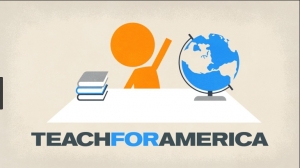
Teach for America (TFA) has served underprivileged American children for 27 years, and has helped to improve the education of millions of kids, from Louisiana to Idaho, and now faces issues such as budget cuts and teaching grants repurposed as loans. A fair number of Goucher alumni join the program, with six Goucher alumni joining the 2017 corps, as Madeline St. John reported for the Quindecim this past year. The Trump administration’s proposed budget for the 2019 fiscal year has all but eradicated federal funding for the program. Additionally, at least 12,000 TFA teachers have had their grants turned into loans they are now required to pay back by the Department of Justice (DOJ) and Department of Education (DOE), according to a recent government study reported by NPR.
One of the draws of working for TFA to many aspiring undergraduates and soon to be graduates is the grants offered in return. More specifically, the Department of Education’s Teacher Education Assistance for College and Higher Education (TEACH) grants, which are $4,000 a year, and come with requirements that teachers must meet. Teachers are required to teach a subject, such as math or science, in a low-income school for at least four years, and must submit paperwork annually to remain certified for the grant. If a teacher fails to meet the qualifications to continue their certification for the grant, it is then turned into a federal loan with interest. This is where TFA has recently experienced issues.
Unsurprisingly, the grants (and then loans) are not actually handled by the Department of Education, but contracted out to a third party called FedLoan. This March, NPR discovered a Department of Education study (both linked to below) that found that 63% of grant recipients failed to continually certify their grants and had them converted to loans. While a significant portion of that 63% was disqualified for legitimate reasons, at least 12,000 teachers are now being forced to repay their grants as loans in full, with interest that began accruing before some were even aware their grants had been converted.
Teachers affected said that they sent in their forms to FedLoan annually for certification, and had met all requirements, only to be told by FedLoan and the federal government that their paperwork was not processed correctly, and that they must repay the new loans in full. In response, lawsuits have been filed by former teachers and the Massachusetts Attorney General, who says the Trump administration DOJ and DOE has mandated that companies such as FedLoan are not subject to state laws or lawsuits. This means that you now have much less legal protection, or likelihood of a successful lawsuit, if you are a TFA member who has accepted grants or a hopeful undergraduate applicant to the program in the future, in the case that the Department of Education or FedLoan incorrectly processes your paperwork.
To add to the TFA’s difficulties, the Trump administration’s proposed budget for 2019 does the organization no favors. The proposed FY19 budget cuts DOE funding by $3.6 billion, and includes elimination of funding entirely for the Corporation for National and Community Service (CNCS). This is not a direct cut to the TFA, but does not need to be, as the CNCS runs AmeriCorps. AmeriCorps is important to the functionality of the TFA, as they declared in their response to the budget “…AmeriCorps Education Awards reduce the financial barriers to service, enabling Teach for America and other organizations to provide a route to service for a diverse group of individuals.”
While both of these issues are not either direct conversion of grants to loans or federal budget cuts leveled by Trump directly l at TFA, they hamper the organization’s ability to function, and show a lack of regard for the program’s continuation. Both recent developments additionally paint a worrisome future for TFA. Besides the outrage stories such as grant-loan conversion due to a government agency incorrectly processing paperwork, and budget cuts to federal community service programs may rightfully inspire, they may also dissuade future Goucher applicants from applying to work with TFA.
